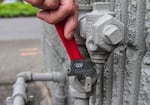Natural gas, water and electricity can make life pretty comfortable. Without them, there'd be a few less warm meals and evenings by the fireplace.
But in the wake of a natural disaster like an earthquake, those tools of comfort become potentially serious threats to health and well-being. Leaking natural gas is a major source of fires after a disaster, and tap
with harmful microbes or chemicals, according to the Federal Emergency Management Agency.
Disaster preparedness experts recommend that you know
how to safely turn off these three utilities
immediately after an earthquake.
Natural Gas
Because leaking natural gas can be such a threat, FEMA suggests that everyone in a home knows how to turn off the main valve.
If you smell gas or hear it leaking, you should open a window if possible and leave the area immediately on foot before trying to turn off the gas. You should only try to turn off the gas yourself if it is safe to do so.
The shutoff is typically the first valve on the pipe that runs into the gas meter from the buried line. Some newer meters have the shutoff located on the pipe that goes from the gas meter to the home.
In many homes, the gas meter is located somewhere
on the front third of the house
, according to Washington state's Emergency Management Division.
Northwest Natural Gas Company's website says "it's always safest to leave the area immediately and call us." However, in the aftermath of a significant natural disaster, the company will be flooded with work, so it could take days or even weeks to reach your home.
Northwest Natural recommends only turning off your gas if you smell a gas leak, hear hissing or see the meter running up quickly, which indicates a leak. That's because if you turn off your gas, you have to leave it off until a trained technician can check your home and ensure it is safe to turn it back on.
To shut off the gas, use a wrench to turn the valve a quarter turn in either direction so it's perpendicular with the pipe. If the valve is parallel with the pipe, it means the gas line is open. Northwest Natural suggests using a crescent wrench or other adjustable wrench to turn off the utility.
Carmen Merlo, director of the Portland Bureau of Emergency Management, warns that a standard wrench could produce a spark that could ignite leaking gas. If possible, you should use a wrench that is designed not to spark against the metal of the gas meter.

The Federal Emergency Management Office recommends that every household have the appropriate tools to shut off their gas and water in the event of a natural disaster. The shutoff is typically the first valve on the pipe that runs into the gas meter from the buried line. Some newer meters have the shutoff located on the pipe that goes from the gas meter to the home.
Alan Sylvestre / OPB
Denise Everhart with the American Red Cross says a person can also buy a special wrench with a fitted gas-shutoff slot. She says the wrenches are typically inexpensive and can make turning off the utility easier in the dark.
People living in multi-unit apartment buildings should consult with the property owners about disaster preparedness plans.
In the event of an earthquake, gas companies are going to be flooded with work, so it could take weeks before someone can inspect your home.
Some companies make earthquake sensors that will automatically turn off natural gas in a home if it detects significant shaking. Gas companies recommend that only trained professionals install those devices.
Electricity
Turning off the power to a home is crucial after a disaster because sparks from electric devices could ignite natural gas leaks.
Unlike gas, turning off the electricity doesn't require any tools. To shut it down, locate the electrical circuit box and switch off all the individual circuits before turning off the main circuit.
Power should remain off until a professional can ensure there are no gas leaks in the home.
Water
Water is one of the most crucial resources anyone needs to secure after a disaster. The best preparation is to have ample water reserved beforehand.

It took the Stephens approximately two minutes to find out where to turn off the gas and water supply to their house.
Nate Sjol / OPB
But a home also has several sources of water that are potentially useful if gathered as soon as it is safe to do so. Here are some tips for collecting water after an earthquake:
Turning off the main water valve does two things: It prevents contaminated water from entering the lines in a home, and it keeps gravity from draining water out of the home's lines if there is a break in a pipe outside.
To turn off the water, locate the main shut off valve and turn the knob or handle clockwise until it's completely closed. FEMA recommends replacing the valve if it is rusted and difficult to close fully.
Again, government agencies say that you shouldn't turn the water back on until you know it is safe to do so.

